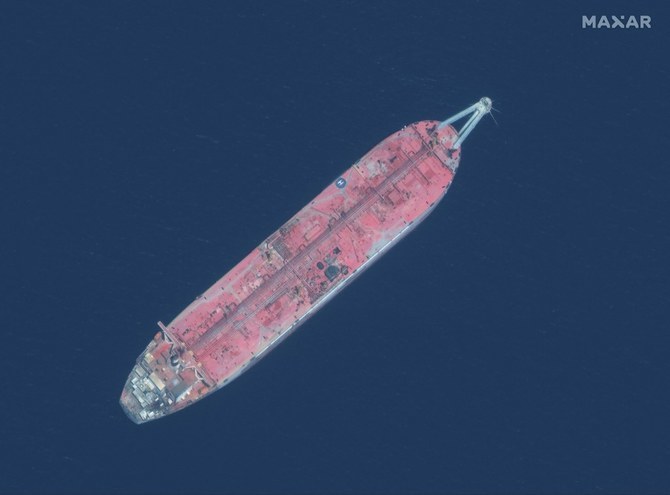*Replacement vessel Nautica expected to sail from Djibouti to the Safer site soon
The UN said that the current operation to salvage the decaying Safer tanker is proceeding efficiently and that the long-awaited transfer of more than a million barrels of crude oil from the tanker to a new one will begin “soon.”
“The work to prepare the FSO Safer for the offloading of its oil has progressed well,” Russell Geekie, communications advisor for UN Humanitarian Coordinator David Gressly, told Arab News.
“We expect the replacement vessel Nautica to sail from Djibouti to the Safer site very soon to take on the oil. Once it begins, the transfer operation will take about two weeks,” he said.
After years of resistance, the Iran-backed Houthis permitted international engineers to board the deteriorating FSO Safer tanker moored off Hodeidah in western Yemen.
Local and international environmentalists and officials have long warned of a massive environmental catastrophe in the Red Sea if the ship exploded or fell apart because it has not been subjected to normal maintenance since the Houthis took control of Hodeidah province in early 2015.
Images of seawater flowing into the tanker’s rooms as rust eats away at the walls have grabbed international attention during the past three years.
The UN official said that even if the tanker was unloaded it would still pose a threat, pleading for additional donations to complete the mission, which includes recycling the tanker and attaching the new ship to the anchor leg.
“Even after the oil transfer, the Safer will continue to pose a residual environmental threat. The aging tanker will still hold some viscous oil and remain at risk of breaking apart,” Geekie said.
“To finish the work the UN has started, an additional $28 million in funding is urgently required, including to tow the Safer to a green recycling yard and safely tether the replacement vessel to a catenary anchor leg mooring buoy to ensure safe storage of the oil.”
Officials from Yemen’s internationally recognized government said that they were informed by the UN that the first phase of the salvage operation had been completed, during which engineers tested the level of wall erosion and introduced inert gas to the ship to minimize oxygen content in an effort to prevent a fire.
“The tanker is now ready for unloading,” a Yemeni government official who spoke on condition of anonymity told Arab News, adding that the Yemeni government, in cooperation with the UN, had established three emergency rooms in Hodeidah, the Red Sea Mocha and Aden to monitor the transfer of the crude. ARAB NEWS




